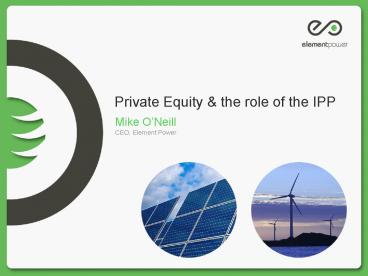Private Equity - PowerPoint PPT Presentation
Title:
Private Equity
Description:
Private Equity & the role of the IPP Mike O Neill CEO, Element Power Element Power Global renewable energy development IPP Backed by Hudson Clean Energy PE ... – PowerPoint PPT presentation
Number of Views:118
Avg rating:3.0/5.0
Title: Private Equity
1
Private Equity the role of the IPP
- Mike ONeill
- CEO, Element Power
2
Element Power
- Global renewable energy development IPP
- Backed by Hudson Clean Energy PE fund
- Established late 2008
- Acquired Helium Energy Sept 2008
- Extensive portfolio of wind and solar PV assets
3
Element Power
establishing its footprint
4
Management Team
establishing its footprint
Chairman Pedro Barriuso
CEO Mike ONeill
CEO North America Ty Daul
COO North America Raimund Grube
Founder Helium Energy Headed Renewable Energy
and Engineering Units Iberdrola
Commercial Director RES 15 years in the sector
Head of development in the US PPM Energy Lead
role in unregulated power business Entergy
Managing Director, Midwest Western US PPM
Energy Gas Project Developer Enron
5
Hudson Clean Energy Partners
- Tremendous sector knowledge 150 years combined
clean energy experience - Extensive experience making and profitably
monetizing investments - Over 1.5 billion invested in leading clean
energy franchises and assets at Goldman Sachs - Generated a 82 gross IRR, 2.2x multiple, 2.2
year average holding period
Solar
Wind
Biofuels
Other
6
Role of Private Equity in Renewable Energy
Investing
- Private equity plays a crucial role in investment
life cycle of renewable energy - Provides essential scale-up capital to grow
companies beyond venture stage
Private Equity
7
Private Equity and the MA are Vital to the
Scale-Up of the Clean Energy Sector
- To achieve the appropriate scale, clean energy
companies will require the investment discipline
and capital typically found in the private equity
and hedge fund sectors - Venture-backed companies rarely access public
market capital without private equity or hedge
fund capital - Since 2005, only a few notable exceptions
Comverge, EnerNOC, Oxford Catalysts and Hoku
Scientific
Strategic Sale
Equity Infusion
IPO
Hatch Companies
Secondary Sale
Scale-Up of Companies
8
Massive Investment Needed to Roll Back C02
Emissions
- Cumulative Clean Energy investment to date
(2008) 535.7 Billion - The International Energy Agency projects
substantial additional investments in Clean
Energy to 2050, necessary to bring global CO2
emissions back to current levels. Cumulative
Clean Energy investments
- The ACT scenario (investment in existing
technologies) predicts additional investment
needs at 17 Trillion between now and 2050 an
average of 400 Billion per year - The BLUE Scenario (investment in future
technologies including those not yet
market-competitive) predicts additional
investment needs of 45 Trillion between now and
2050 an average of 1.1 Trillion per year
Source Cumulative Clean Energy investment to
date New Energy Finance. Projected additional
investment Energy Technology Perspectives
2008, International Energy Agency.
9
New U.S Stimulus Offers Sizeable Demand Boost
- Congress has adopted a stimulus goal to double
renewable energy generation by 2011 and is
expected to adopt a 10 renewables penetration
goal by 2012 - 134 billion of new capital investment and
renewable energy infrastructure required by 2011
217 billion required by 2012(1) - Pace of investment in renewable energy and energy
efficiency expected to increase dramatically over
prior three-year period(2)
- Hudson Estimates
- (2) 2006 - 2008 cumulative installed
capacity Alternative Energy e-Track 2009-
2012 Hudson estimates
10
Major Public Market Participants
- The largest renewable energy companies still have
substantial room to grow before challenging the
incumbent energy players - Current clean energy public market caps a mere
fraction of traditional energy firms - Potential issues inability to deploy capital in
scale, lack of liquidity and volatility
Source Bloomberg (6 March 2009)
11
Main Wind Energy Share Prices, 2008 - Present
12
Headwind Facing Clean Energy Sector
- In light of the current market turmoil, public
market capital declined precipitously in Q4 2008 - However, private equity and hedge funds continue
to invest at a steady pace
Equity Investments into Clean Energy Companies by
Quarter
(1)
Pronounced drop in investment H2 2008
Source New Energy Finance
(1) Includes Iberdrola Renovables initial public
offering
13
Optimal Environment for Private Capital
- Institutional balance sheets dominate investments
- High quality opportunities are the scare resource
- Leverage and liquidity drive returns
Optimal Environments for Investment Banks and
Corporations
LOW Availability of Capital HIGH
Optimal Environments for Private Capital
We are here
- Private capital pools dominate investments
- Investment capital is the scare resource
- High quality opportunities drive returns
14
Rising Scale of Private Equity
Estimates based on assumption that private equity
maintains its share of 2008 dollars invested in
renewable energy
Source New Energy Finance Hudson estimates
15
Wind Energy Ownership
- Dominated by utilities but some key IPP owners
16
The Role of the IPP
- Fills the gaps between utility ownership
- Critical to kick-start renewable energy
investments in new markets - Pre-consolidation warehousing for small,
distributed operating RE assets - Typically privately funded utilising structured
finance based on monetisation of renewable
incentives - Increase in the presence of infrastructure funds
- - low risk, low yield, long term cash flow
17
Challenges to the IPP Model
- Competition from utilities
- Global liquidity crisis in banking sector
- Leverage and tenure of project finance
drastically reduced - Private equity funding more selective
- Denominator effect
- The M word can no longer be mentioned
- - limited ability to take benefit of upside in
electricity prices - Current market benefits serious and well funded
players
18
Thank you!
- Mike ONeill
- CEO, Element Power
- mike.oneill_at_elpower.com
- www.elpower.com































